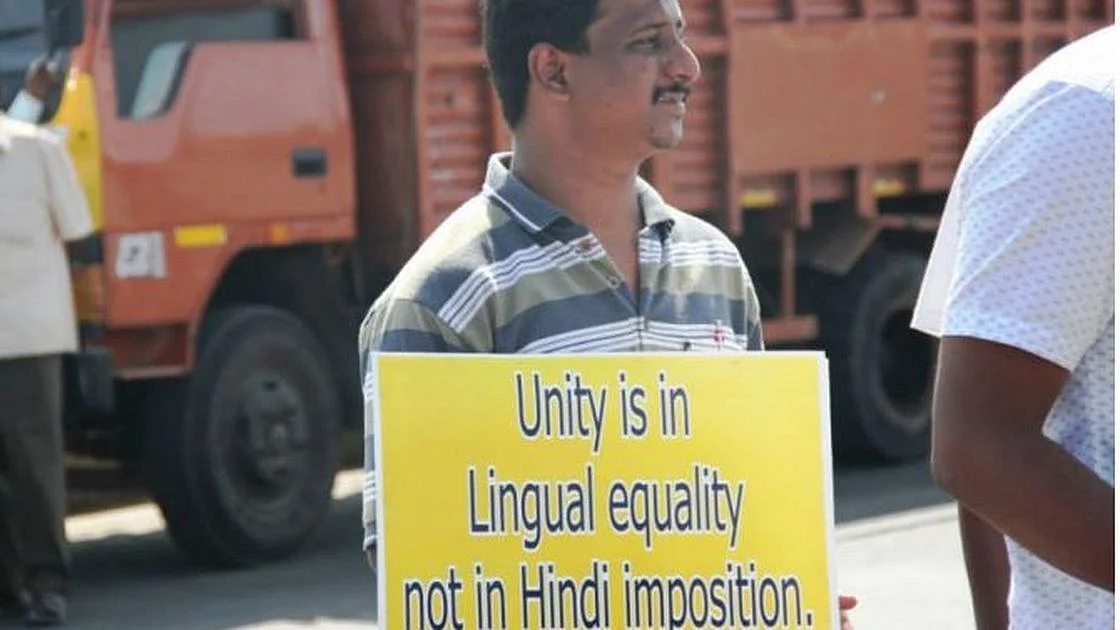Amit Shah’s statement on adopting Hindi for official communication unwarranted and provocative
Stirring up the language issue, which was broadly settled in 1965, may unnecessarily rake up an agitation and narrow the already depleting job opportunities

Union Home Minister Amit Shah has stirred up a huge controversy by stating that Hindi being the official language, it should be the medium for correspondence and discussions between states. This has evoked a vehement and justifiable strong reaction from southern states, particularly Tamil Nadu, which has always opposed imposition of Hindi in non-Hindi speaking states, forming 56 per cent of the population.
Shah, who chairs the official language committee, said 70 per cent of the agenda of the Cabinet is prepared in Hindi. He also said Prime Minister Narendra Modi has decided that the medium of running the government is the official language and this will increase the importance of Hindi.
Knowledge of English was an added advantage to Indians and this is perhaps one of the reasons for Indians being preferred in IT industry world over particularly in software. This is true of medicine, engineering and science. Indians are a cut above others in the world due to this advantage.
It appears the Indian government is not bothered if this advantage is lost even as other countries like China is trying hard to acquire it. In mid-90s, Chinese authorities felt they were handicapped in their pursuit of export-led economic development to take advantage of globalization because of this language barrier. So, the government in China decided to make learning of English compulsory in schools.
Today, all Chinese passing out of schools in China know English very well. This had helped China become a top goods and services exporter. China’s foreign exchange reserves is close to $4 trillion against India’s $600 billion. China is now an over $15 trillion economy against India’s $3 trillion economy. Chinese exports are 6 to 7 times more than that of India.
In the case of India, the government seems to be going in a reverse gear, trying to lose an advantage which the country already possessed. No one is against Indian languages and everyone should learn their mother tongue and perhaps one other language apart from English.
Though the three language formula has been implemented in most of the country, it is unfortunate that schools in North India and in areas where Hindi is the mother tongue do not offer a third language, that is from South or East India.
Many schools in North India do not even teach proper English. Though schools are supposed to pursue three language formula, they often only teach Hindi and perhaps some English.
This puts people in East and particularly South India to some disadvantage as they are made to learn Hindi apart from their mother tongue and English. Of course, the more languages one knew, the better it is. Late Prime Minister P V Narasimha Rao knew 14 languages. He could not only converse but also do scholarly and literary work in those languages. They included Telugu, Tamil, Hindi, Sanskrit, Urdu, Marathi, French, Spanish, Kannada and Malayalam.
Late Tamil Nadu Chief Minister J Jayalalithaa too was conversant in several languages including Tamil, English and Hindi. But it is difficult to find any North Indian politician who is conversant in any of the South Indian languages apart from Hindi and English.
As Mahatma Gandhi said, one should practice what he preaches. While BJP top brass may advocate imposition of Hindi, one wonders why most of these BJP politicians send their children and grand-children to English medium schools. This applies to politicians in South as well.
Late Karunanidhi, former Tamil Nadu Chief Minister and DMK supremo, who spearheaded the movement against imposition of Hindi among Tamils, used to privately coach Hindi to his daughter Kanimozhi, now a DMK MP, so that she did not have any difficulty in conversing in Hindi when in Delhi.
Politicians have one standard for them and another for common man. Politicians, be it from North or South, are known for double standards and unfortunately, it’s the common man who suffers in the end.
In fact, it is in the interest of common man to learn more languages so that their job opportunity widens and knowing English is even more important in today’s world. Not only English and other Indian languages but attempts should be made to learn other foreign languages as well like French, German, Spanish, Chinese and Russian.
At a time when the world has become a global village, our politicians rake up such non-issues for some short-term electoral gains without realizing the consequences and the damage that they are doing to the youth by restricting their job opportunities.
When jobs are scarce, particularly after Covid, stirring up language issue, which was broadly settled in 1965 after the anti-Hindi agitation, is unwarranted and may unnecessarily rake up an agitation and narrow the already depleting job opportunities.
Not knowing English is also a disadvantage in pursuing technical education, particularly medicine, engineering, science and economics.
(IPA Service)
Views are personal
Follow us on: Facebook, Twitter, Google News, Instagram
Join our official telegram channel (@nationalherald) and stay updated with the latest headlines